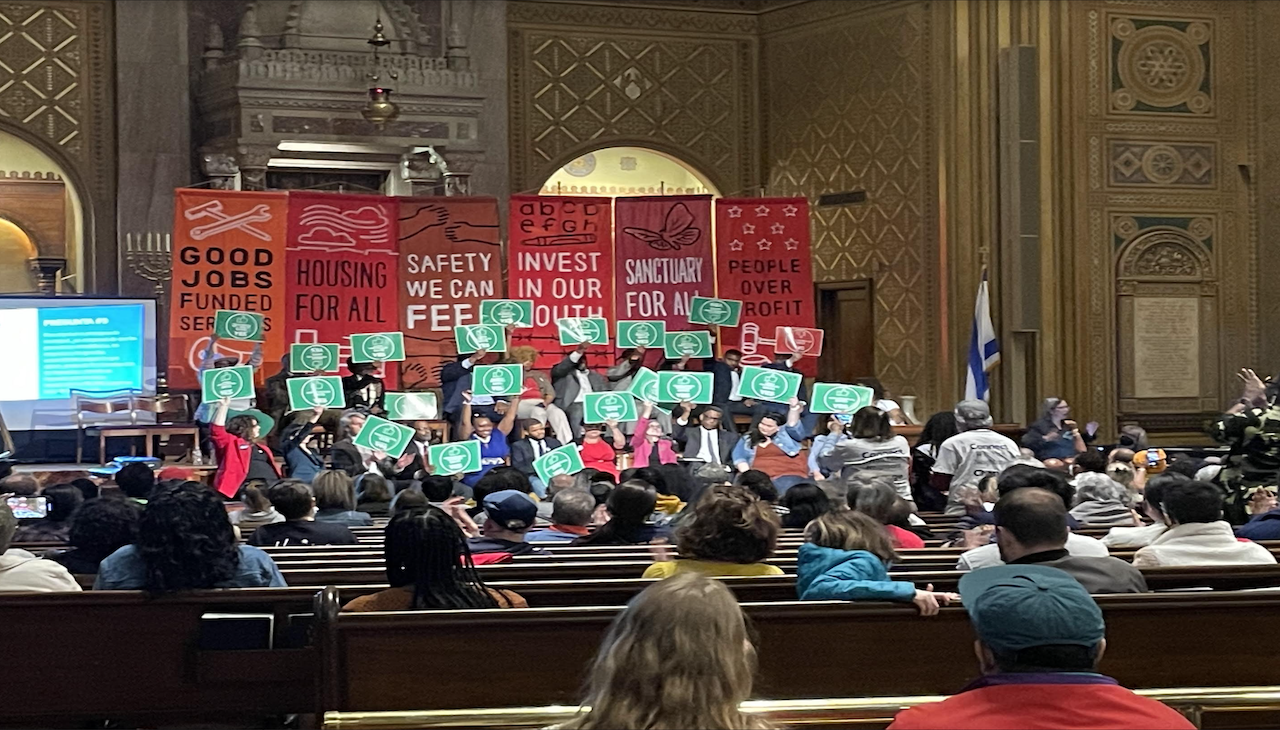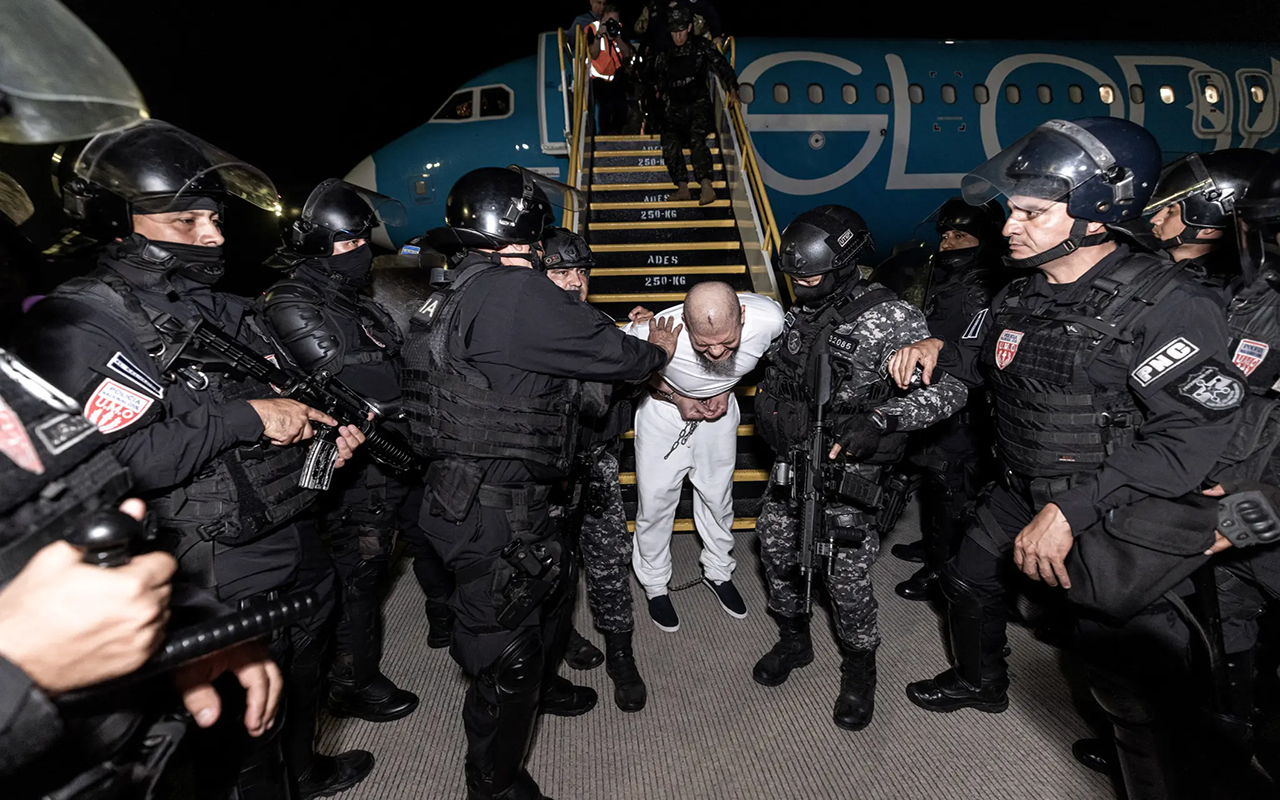
Candidates for Philly City Council make sweeping pledges, with one Republican exception
A first-of-its-kind forum hosted by an alliance of over 20 progressive organizations garnered promises on hot-button election issues.
The jam-packed field of City Council candidates in Philadelphia held up ‘yes’ banners, making sweeping promises to an energized crowd on Sunday, March 26, as panelists from progressive groups sought to garner commitments in the Congregation Rodeph Shalom at the first forum for at-Large council hopefuls.
At the podium, panelists who represented 29 organizations questioned the candidate’s positions on critical election issues — including alternative policing, Land Bank reform, and ideas to fund those programs —- but weren’t necessarily swayed by the green-banner pledges.
The one Republican candidate, Drew Murray, resisted pledging.
Twenty-six of the 29 candidates headed to the May primary sat in the room. They effusively raised their banners displaying affirmatives for each of the commitments posed by the Alliance for a Just Philadelphia, which hosted the panel and named it the 2023 People’s Forum.
“Generally, I felt like people were just saying yes to a lot of things,” thought Elisa King, a Counselor at Community College of Philadelphia and union member of the American Federation of Teachers, or AFT.
“But I don’t know that people have a plan on how they’re going to be able to enact these things or fund them… many of the candidates say yes, but in reality, they don’t have any idea of how to get it done,” King, a Dominican woman, continued.
On alternative policing
The first issue, raised by Free the Ballot and the Abolitionist Law Center, questioned whether candidates would commit to funding mobile crisis health units, a model of alternative policing pioneered by Amistad Law Project by way of former City Councilmember Helen Gym.
In 2021, Gym secured $7.2 million in funding with federal dollars from the American Rescue Plan in the aftermath of the shooting of Walter Wallace Jr., a 27-year-old Black man who was navigating mental health issues before being killed by police in West Philadelphia.
Gym’s pilot program saw initial success, but later underfunding resulted in a limited number of units that account for much of the city, a factor that Gym stressed was the cause of the initiative’s current performance.
Erika Almirón, one of two competing Latinas in the at-Large roster, said the issue was two-fold, and while she would want to continue funding the program, she added that “we actually need to fund the 911 call center to be able to answer the phones.”
“It’s a very traumatizing job. It’s not enough money, and we need to be able to fund that, make sure it’s fully staffed, and then also fund the mobile crisis units.”
Luz Colón, the second Latina poised to appear on the primary ballot, pointed towards transparency issues and questioned whether the way funds were distributed was adequate for the program.
“We need to know where some of the funds are being allocated… I think city council needs to know, or the general public needs to know where all of those funds go.”
Reforming the Land Bank
To address scattered, vacant lots in Philly, former city councilmember for District 7 Maria Quiñones Sánchez created the Land Bank in 2013.
The premise of Quiñones Sánchez’s bill was to establish an office — the Vacant Property Review Committee — to acquire tax-delinquent, abandoned properties in tandem with City Council and sell them, whereby both bodies would become proprietors and sellers of those lots.
But critics say the Land Bank lacks a coherent vision for the blighted lots as, over the years, most went to politically-connected bidders who purchased land for below-market-rate prices, shorting the city’s revenue and adding layers of bureaucracy.
“I think that we’re not focused on the individual needs of communities and organizations, so I would think that there are ways that we could redefine how we’re giving communities access to land,” Almirón, who pledged to reform the Land Bank, told AL DÍA.
RELATED CONTENT
Quiñones Sánchez herself attempted to reform the bill she introduced years into its implementation period, but groups have sustained that city council is the primary hurdle.
Colón, citing food shortages, said she would think about ways to forward green spaces and create a food source for vulnerable populations, according to an interview with AL DÍA.
“For that particular question, I think we definitely need resources for our community in terms of different lands in the area to create more green spaces for our most vulnerable,” Colón said.
Drew Murray is open to negotiating but isn’t wholly on board
As an overwhelming majority of candidates promised to deliver on every issue raised at Sunday’s forum, Drew Murray — the lone Republican candidate participating at the event —- said no to most.
“A lot of those questions were two-part answers. If there was a middle answer, I would give it,” Murray said.
An example of his resistance started with mobile crisis health units. Murray said that although he is open to funding alternatives to policing, he would not take police out of the equation.
“Would I support mobile health units along with the police? Absolutely,” Murray asserted.
“It’s unsafe for those people working, and there are a lot of situations where you need police officers, and you need people to not only protect the people in a health crisis but the people around.”
Currently, mobile crisis units grapple with the number of dispatches, given the starkly low number of available responders who cover ground for citywide emergency calls, but there are no documented instances of immediate danger to responders.
But even if Murray stopped short of agreeing with any of the propositions, in his introductory speech, Murray sold himself as a pragmatic who is willing to negotiate at the table.
“I lead organizations, and oftentimes I am the only Republican in the room,” Murray said, adding that within many rooms, most of them occupied by Democrats, “they continue to elect me… because they respect my pragmatism, they respect my common sense.”










LEAVE A COMMENT: